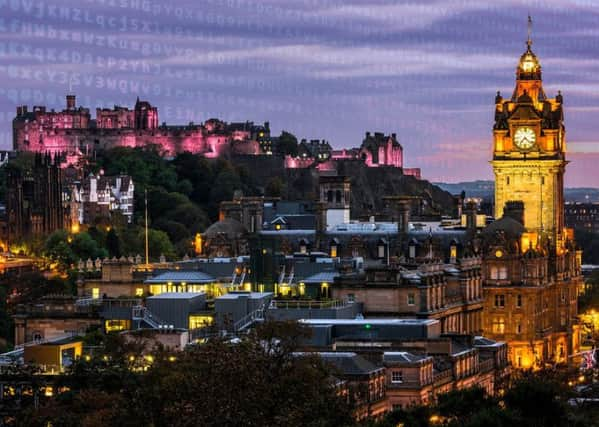Rallying call for future of Edinburgh's '˜unloved' tourism industry


The city’s main marketing body has admitted the tourism sector is “under-rated and can be unloved” – months after heritage chiefs called for action to halt the “commercial exploitation” of its historic environment.
But Marketing Edinburgh has also declared that the city cannot afford to give the impression that it is “full” and wants to “turn away visitors”.
Advertisement
Hide AdSpeaking at a reception in Edinburgh Castle, chairman Gordon Robertson suggested that ambition had become “a dirty word”, and called for the city’s tourism sector to be “properly resourced, properly funded, properly understood and properly celebrated”.
Edinburgh’s tourism industry supports around 30,000 jobs and be worth more than £1.3 billion to the economy. The city has seen visitor numbers soar by more than half a million in the past five years to 3.85 million. However, it is pursuing a target of boosting visitor numbers by a further third by 2010 and generate an additional £485 million.
The soaring visitor numbers sparked controversy in the summer when Edinburgh World Heritage officials said the city was at risk of becoming a “hollow museum shell” like Venice if it did not “seek to understand the capacity limits of our fragile, historic city”.
It said at the time: “Hotel occupancy is high, and the growth of the short-term holiday lets sector has been exponential in the past five years. Attractions are reporting record increases in numbers and are near capacity, while Old Town residents are under increasing pressure from the visitor economy. Does this mean the city is now full?”
The Cockburn Association has warned the city has become “dysfunctional” during peak periods because so many people are flooding in.
However, Mr Robertson insisted tourism was “a major force for good” for Edinburgh and urged industry colleagues to “shun complacency” and not rest on their laurels.
Advertisement
Hide AdHe said: “Why should we curb our ambition? Why should we cap our success? We know that Edinburgh can go further and that we can generate more wealth, more investment, more inclusion, more jobs, more opportunity, more connectivity, more success.
“It’s not just us saying that. When we go out around the world selling Edinburgh to countries and airlines the demand is there. That doesn’t come without challenges. We must balance the growth and benefits with the need to protect the very fabric and spirit of what is behind the success that we have.
Advertisement
Hide Ad“How do we protect our city and our product as we grow? I don’t think it’s by declaring the city full and arguing that Edinburgh should turn away visitors. It’s not and we can’t afford to. How do we protect our wonderful built environment? I don’t think it’s by creating committees to stop things happening and then watch wonderful buildings crumble into unused dilapidation.
“How can we bridge the gap between those who enjoy the wealth creation opportunities in the city and those that can’t find a place on that ladder yet? I don’t think it’s by suggesting that we’ve had enough growth.
“We are focused on a creating a realistic, sustainable and – most importantly – ambitious strategy for the next five years. It’s an important and difficult time. We’re doing this in the face of turbulence at global, national and local levels.
“The words of the boxer Mike Tyson echo in my mind. He said, ‘Everyone has a plan until they get punched in the mouth.’ The only thing that’s certain is that somebody will punch us in the mouth, metaphorically. Tourism in all of its forms is a major force for good for the city. Yet it is under-rated and can be unloved. But we’re going to shout about it, we’re going to be ambitious for it and we won’t apologise for it. We want it properly resourced, funded, understood and celebrated.”
Edinburgh World Heritage director Adam Wilkinson said: “Part of our future prosperity as a city depends on developing a more sustainable approach to tourism. This is one, to quote from the UN definition, that is ‘committed to making a low impact on the historic environment and local culture, while helping to generate future employment for local people’.
“I think we can all agree that makes a huge amount of sense. We look forward to working with our partners across the city on an approach to the development of the visitor economy that benefits visitors, local businesses and residents in equal measure.”
Advertisement
Hide AdCockburn Association Terry Levinthal said: “Tourism is crucially important for the city. But the point is how it is managed, or rather how it has not been managed, which is now manifesting itself in a range of issues for those who live and work in the city.
“It’s telling that whenever you look at any research into why people visit Edinburgh the two top reasons are its historic architecture and townscape. The genius of the place and the very qualities that the Cockburn Association has been arguing to protect, enhance and improve is what creates the economic bases from which tourism can grow and prosper.
Advertisement
Hide Ad“It’s easy to be bullish and blustering within your own sector, but when you need to be engaging with other sectors it becomes less about the language of punching people in the mouth and more about working out ways in which you can pat each other on the back.”